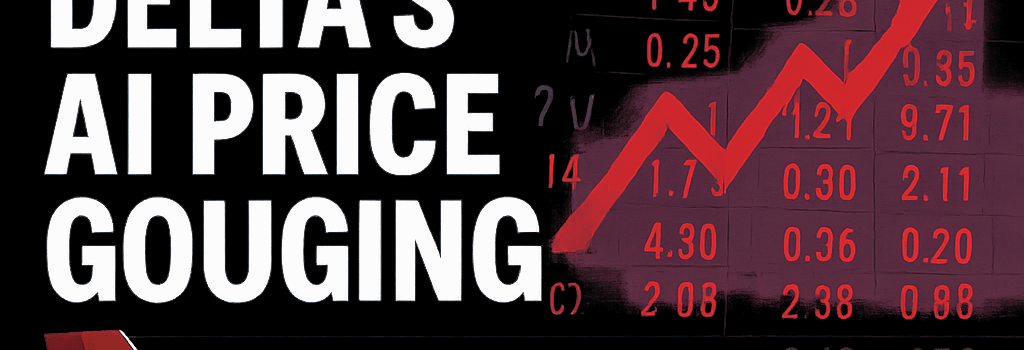Lawmakers Seek to Ban Delta’s AI Price Gouging

One week after Delta Air Lines confirmed it is expanding a pilot program that uses artificial intelligence to adjust airfares based on aggregated customer data, Democratic lawmakers have introduced legislation to prohibit what they call “predatory surveillance pricing” and “algorithmic wage fixing.” The Stop AI Price Gouging and Wage Fixing Act aims to draw a clear legal boundary around the use of personal data in automated pricing and compensation decisions.
Lawmakers Propose Legislative Ban on Surveillance-Based Pricing
In a joint press release, Reps. Greg Casar (D-Texas) and Rashida Tlaib (D-Mich.) unveiled the bill’s core provisions. It would:
- Ban surveillance-based price setting: Companies could no longer use algorithms that infer “desperation” or maximum willingness to pay from personal, demographic, or behavioral data.
- Ban surveillance-based wage setting: Employers would be prohibited from using AI models that lower wages based on an individual’s financial status, associations, or demographics.
- Private right of action: Any consumer or worker could sue for damages—mandatory restitution of overcharges or underpaid wages plus a minimum of $3,000, with treble damages for willful violations.
Key Technical Definitions
- Surveillance-based pricing: Dynamic pricing algorithms that integrate personal identifiers, browser cookies, mobile-app telemetry, or social-media data to segment customers and tailor fares.
- Algorithmic wage fixing: Automated payroll systems that adjust compensation based on predictive scores generated from individual behavior or credit data.
Delta’s AI Pricing Model: A Technical Breakdown
Delta says its AI-driven pricing engine does not target individuals with bespoke offers, but relies on aggregate demand forecasting. According to Delta’s spokesperson, the model uses:
- Time-series forecasting: Recurrent neural networks (e.g., LSTM) trained on historical booking curves, seasonality, and day-of-week effects.
- Gradient-boosted trees: XGBoost-based modules to predict price elasticity by origin-destination pair and fare class.
- Real-time market signals: Jet fuel price feeds (Platts index), competitor fare scraping via APIs, and macroeconomic indicators.
- Feature engineering: Variables such as booking lead time, loyalty-tier distribution, device type, and flight cancellation rates.
While Delta denies using personal PII (e.g., age, gender, ZIP code) to individualize fares, lawmakers point out that advanced feature-crossing techniques can infer sensitive attributes even from aggregated data.
Industry Landscape: Vendors, Tools, and FTC Inquiry
In January 2025, the Federal Trade Commission sent civil investigative demands to eight major AI pricing vendors—Mastercard, Revionics, Bloomreach, JPMorgan Chase, Task Software, PROS, Accenture, and McKinsey & Co. These firms confirmed serving at least 250 clients across grocery, apparel, travel, and delivery services.
The FTC’s preliminary report warned that “widespread algorithmic personalized pricing” could upend market competition and harm consumers by making discounts opaque and unpredictable.
Technical Safeguards and Privacy-Preserving Alternatives
Experts advocate for privacy-preserving approaches that enable demand forecasting without invasive profiling:
- Federated learning: Training shared models on-device so raw personal data never leaves a consumer’s smartphone.
- Differential privacy: Injecting noise into aggregated statistics to guarantee individuals cannot be reidentified.
- Homomorphic encryption: Performing demand predictions on encrypted feature vectors.
Global Context: EU Regulations and Data Protection
Under the EU’s General Data Protection Regulation (GDPR), any automated decision-making that significantly affects consumers—such as differential pricing—requires explicit consent and a right to human review. The Digital Markets Act further constrains gatekeepers from unfairly leveraging personal data for market power.
Expert Opinions and Ethical Considerations
“When companies use AI to tailor prices to an individual’s willingness to pay, they exploit economic vulnerability,” said Dr. Jane Smith, Professor of Computational Economics at MIT. “Transparent, rule-based frameworks are essential to protect consumers and maintain market integrity.”
Public Citizen, a consumer-rights nonprofit, endorses the bill and urges Congress to “draw a clear line in the sand: discounts are fine, but not when they’re built on surveillance.”
Policy Implications and Next Steps
If enacted, the Stop AI Price Gouging Act would open multiple enforcement channels: state attorneys general, the Federal Trade Commission, the Equal Employment Opportunity Commission, and private litigants. Companies found in violation could face restitution orders, civil penalties, and reputational damage.
GOP FTC commissioners Andrew Ferguson and Melissa Holyoak dissented from the preliminary report, arguing it was “premature” and “politicized.” However, they conceded that a comprehensive final report could provide valuable guidance on data-driven pricing and privacy law reform.
Conclusion: Toward Transparent and Fair AI Pricing
As AI-driven dynamic pricing becomes ubiquitous—from airlines to grocery chains—lawmakers and regulators are grappling with how to balance innovation with consumer protection. The Stop AI Price Gouging Act represents a landmark effort to ensure that advances in machine learning and cloud computing do not come at the expense of fairness or privacy.